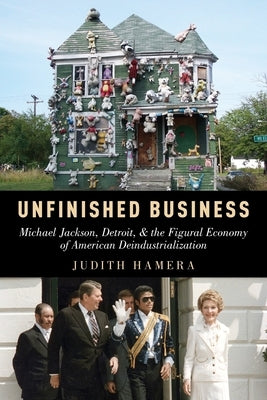1
/
of
1
Oxford University Press, USA
Unfinished Business: Michael Jackson, Detroit, and the Figural Economy of American Deindustrialization
Unfinished Business: Michael Jackson, Detroit, and the Figural Economy of American Deindustrialization
Regular price
€35,95 EUR
Regular price
Sale price
€35,95 EUR
Shipping calculated at checkout.
Quantity
Couldn't load pickup availability
How does structural economic change look and feel? How are such changes normalized? Who represents hope? Who are the cautionary tales? Unfinished Business argues that U.S. deindustrialization cannot be understood apart from issues of race, and specifically apart from images of, and works
by and about African Americans that represent or resist normative or aberrant relationships to work and capital in transitional times. It insists that Michael Jackson's performances and coverage of his life, plays featuring Detroit, plans for the city's postindustrial revitalization, and Detroit
installations The Heidelberg Project and Mobile Homestead have something valuable to teach us about three decades of structural economic transition in the U.S., particularly about the changing nature of work and capitalism between the mid 1980s and 2016. Jackson and Detroit offer examples of the
racialization of deindustrialization, how it operates as a structure of feeling and as representations as well as a shift in the dominant mode of production, and how industrialization's successor mode, financialization, uses imagery both very similar to and very different from its predecessor.
Author: Judith Hamera
Publisher: Oxford University Press, USA
Published: 11/01/2017
Pages: 304
Binding Type: Paperback
Weight: 0.95lbs
Size: 9.10h x 6.10w x 0.70d
ISBN: 9780199348596
Review Citation(s):
Choice 04/01/2018
by and about African Americans that represent or resist normative or aberrant relationships to work and capital in transitional times. It insists that Michael Jackson's performances and coverage of his life, plays featuring Detroit, plans for the city's postindustrial revitalization, and Detroit
installations The Heidelberg Project and Mobile Homestead have something valuable to teach us about three decades of structural economic transition in the U.S., particularly about the changing nature of work and capitalism between the mid 1980s and 2016. Jackson and Detroit offer examples of the
racialization of deindustrialization, how it operates as a structure of feeling and as representations as well as a shift in the dominant mode of production, and how industrialization's successor mode, financialization, uses imagery both very similar to and very different from its predecessor.
Author: Judith Hamera
Publisher: Oxford University Press, USA
Published: 11/01/2017
Pages: 304
Binding Type: Paperback
Weight: 0.95lbs
Size: 9.10h x 6.10w x 0.70d
ISBN: 9780199348596
Review Citation(s):
Choice 04/01/2018
About the Author
Judith Hamera is Professor of Dance in the Peter B. Lewis Center for the Arts, with affiliations in American Studies, Gender and Sexuality Studies, and Urban Studies, Princeton University. She is the author of Dancing Communities: Performance, Difference and Connection in the Global City (2007).
Share


